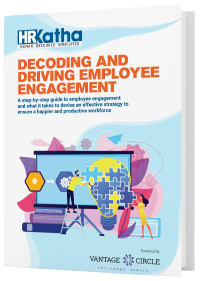Job Satisfaction And Employee Engagement: A Brief Comparison

With job satisfaction and employee engagement being two of HR’s biggest concerns in the last decade, it’s surprising that many people don’t know the difference between them.
But before getting ahead of ourselves, here is an important question for you:
How many of your people are truly engaged?
Chances are, it’s lower than you think. For Example, studies say that in an average company, only 32% are actively engaged. Meanwhile, 50.8% are not engaged, and 17.2% are actively disengaged employees.
This is a big reason why engaging people have been a top priority for global companies in the last decade.
We get it. Engaging your people is easier said than done. However, the benefits actually make the efforts worthwhile. Engaged employees feel happier, excited, and less likely to leave their jobs.
When your people genuinely feel engaged, your business outcomes will see positive growth as well.
Yet, for engagement to happen, the foundation needs to be strong. And that is where the concept of job satisfaction comes in.
Difference Between Job Satisfaction And Employee Engagement
Wait. Doesn’t job satisfaction and employee engagement mean the same thing?
Well, not quite.
Employee engagement is the emotional connection with the company that impacts a person’s dedication and belonging. The more engaged a person is, the more likely they are to display higher levels of loyalty.
On the other hand, job satisfaction is when an employee enjoys the work they do.
Thus, job satisfaction is not driven by a person’s sense of pride. It is instead fuelled by the fulfillment of doing what they love.
It is not a prerequisite that a satisfied employee should also be an engaged one. But for engagement to happen, it’s essential that a worker at least likes- if not loves- the work they do.
However, the fact remains. To drive better business outcomes, both- job satisfaction and employee engagement- need to be sustained.
Ignoring one to improve the other, or worse- mistaking them for being the same will prove to be expensive for you. Turnover will rise, loyalty will suffer, and your culture will get affected.
As a leader, it is a top priority that you avoid such a scenario from happening.
We have outlined some key factors that influence job satisfaction and employee engagement:
Factors That Influence Employee Engagement
Improving employee engagement is about finding the right balance between what your employees want and what they need.
While meeting every employee's expectation is unfeasible, there are key factors that make your people feel valued. Let’s take a look.
1. Rewards and Recognition
If done in a timely and frequent way, rewards and recognition can be powerful motivators.
There is one thing that we know for sure. When people feel appreciated, seen, and valued for their work, it fosters a deep sense of belonging in them.
Rewards and recognition- given in a meaningful way- are the key to inspiring such loyalty.
While rewards are economical, recognition is an emotional event that inspires motivation.
The goal is to create an employee-centric work environment where effort is valued. When such a culture of appreciation happens, employees tend to bring their A-game to work.
2. Work Environment
Your company's work environment has a significant impact on whether people feel engaged and happy at work.
If a leader has tried every possible engagement tactic and failed, the work environment should be the next focus.
An ultra-competitive, toxic, and non-inclusive work environment will wreck any good engagement strategies. Such a work environment pits peers against peers and makes people want to exit.
People seek belonging and value, especially in their workplaces. A big part of that lies in feeling psychologically safe.
Engagement is hard to achieve until your people feel safe, respected and included in the workplace. Respectful treatment of employees at all levels is a must-have for any modern company.
A toxic work environment will destroy any other positive aspect of your culture. To build a company that inspires loyalty, start with the work environment.
3. Employee Benefits
Today’s employees want more than a great paycheck. They want a comprehensive benefits package to go along with it. So to keep your best talent, you must provide an attractive enough benefits package.
In fact, companies that focus on pay and benefits recorded 56% lower turnover.
Employee benefits are more than about recruiting and retaining your top workers. The right benefits have the power to enhance your people’s work-life balance.
Benefits such as health insurance, maternity leave, and tuition reimbursement help in the lead. It is why today’s top talents are concerned about getting the best possible compensation package while joining a new company.
To motivate people to do their best work, offer a mix of monetary and non-monetary incentives that enhance their work-life quality.
4. Company Culture
The company culture of any organization is the most known yet underrated factor. It is because, unlike other engagement measures- improving the company culture is not fast or instantaneous.
Also, the time, efforts, and money required to enhance it are significantly greater. Also, unlike other factors, company culture is influenced by multiple sub-factors such as:
- Appreciation based practices
- Diversity and inclusion
- Fair and non-toxic
- The right people
- The leadership practices
… and many more. A workplace with a poor company culture will result in people leaving faster than they arrive. Thus, companies must focus on building the ideal company culture from the ground up. A couple of factors that companies need to consider are:
- Deciding what the core values, mission, and vision will be
- Focusing on drafting the brand message
- Defining the leadership roles and finding the right people for it
- Placing importance of building a people-first culture
Factors That Influence Job Satisfaction
Satisfied employees are so because they are genuinely interested and happy with the work they do.
Job satisfaction is when people can strive in their careers, supporting them in achieving their goals.
While job satisfaction and employee engagement might not be the same, there is a vital fact that we can’t ignore. When people are satisfied with their jobs, they are more likely to be engaged as well.
When you focus on boosting satisfaction, a large part of engagement gets reshaped as well.
Let’s take a look at the factors that influence employees’ levels of job satisfaction:
1. Career Development Opportunities
Career advancement is an integral aspect of most people’s work-life balance. As a result, it is critical to provide a stable job and ensure that growth does not stall.
Professional success is one of the most empowering aspects of anyone’s life. For any capable employee, the need to upskill and grow is a major priority.
If your people are not talking with you about their growth, they might already think of a career shift. And probably not with your company.
Thus, companies need to see and offer similar career growth opportunities.
When people are encouraged to learn, develop, and are set up for success by their employers, they are more likely to be happy with their work.
Career development opportunities can vary from person to person. Here are some examples of what it may look like:
- Promotions
- Regular training and development opportunities
- Staff exchange programs
- Side project support
- Mentor programs
- Job rotation
2. Job Security
In an economy where everything is uncertain, job security is the most valuable asset for any aspiring job seeker. When people join a company, they expect to receive the same amount of loyalty from them.
Such a mutual relationship of respect will inspire employees to go above and beyond for the job they do. Thus, any business that wants to hire the best people should focus on providing a high level of job security to its employees.
Offering job security can be the most vital thing you can do to boost satisfaction. It advances your brand reputation, bottom line and draws some really talented people.
People who are happy with their work lives will show their dedication to the company through improved performance and productivity.
3. Work-Life Balance
Millennials demand a healthy work-life balance to remain satisfied with their jobs.
People will not be content with their jobs unless they can devote time to their personal lives. Modern workers seek new-age benefits like flexible work, paid vacations, and parental leaves.
Such benefits allow people to grow professionally without compromising on their mental health. In the long run, people with poor work-life balance will
People are more likely to quit if the job causes high stress, tension, and anxiety in their personal lives.
As a result, their work quality will decline, affecting its bottom line in the long run. So, like a domino effect, your people will stop enjoying their work and will eventually quit.
What's Next?
How do job satisfaction and employee engagement impact your daily company operations? Do you have any more insights into how to enhance either of them? We’d love to hear it in the comments below.

Vantage Circle is a simple AI-powered Rewards & Recognition Platform for upgrading your employee experience and engagement for better productivity.






